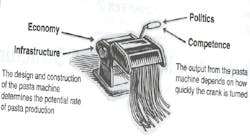The skills gap became regular front-page news fodder a couple years ago. What’s being reported in these stories today is different, though. Now, instead of worrying about a lack of talent to fill the skills void, some in the business media are worried that academics are losing control of their curricula to business. This morning’s Wall Street Journal ran a story titled “Corporate Cash Alters University Curricula.” It reported how companies like IBM are working with Universities like the Ohio State University to develop talent in disciplines like big-data analytics.
These partnerships between academia and corporations aren’t new, but the students affected are. More and more we’re talking about undergrads. Employers, especially in logistics, are recognizing that to get on talent’s radar screens they have to not only get to them earlier in their academic careers but they also have to take more control of what they’re learning. This makes many in academia nervous. Molly Corbett Broad, president of the American Council of Education, was quoted as saying “The most important concern is the absolute requirement on the part of the faculty of independence for their judgment and avoidance of any conflict of interest.”
Parents of these students have no such worries. They’re thrilled that their children are being exposed to the real-world skills gap and are being offered the tools to help close it. So are the kids, but they’re already facing some competition in that effort. A few pages later, in the same edition of the WSJ, was this story: “Big Demand for Skilled-Worker Visas.” Foreign Skilled Workers are competing with each other to snap up the limited number of such visas (limited to 65,000 a year) so they can work for the same companies those undergrads are starting to consider.
But wait—there’s yet another set of competitors vying with those undergrads, grads and skilled foreigners: the already employed. People like you, who are already working in fields where the skills gap is apparent, are feeling the pressure to stay relevant—or else be displaced by someone who not only costs less, but has a more contemporary set of skills. That’s why professional societies and associations offer their members continuing education credits. It also explains why the changing workforce figured so prominently in the Material Handling and Logistics Roadmap recently published by MHI.
The most recent spin on logistics talent development was announced last week. APICS, the association for operations management, which became famous among various industries for its professional certification programs, announced that its Orange County chapter has selected a continuing education partner at the university level. Brandman University’s School of Extended Education is working with APICS on professional development opportunities, including certification via the Certified Supply Chain Professional (CSCP) exam preparation.
My question to Vicki Brannock, senior director at Brandman, was, what will participants get from this partnership that they couldn’t get through either organization by itself.
“Partnerships between educational institutions such as Brandman and professional organizations such as APICS help to facilitate the conversation between employers and higher education to ensure that workforce needs are being met,” she said. “APICS brings the voice of business to the table in order to define the learning outcomes needed in their workplaces. Brandman University understands how to develop and deliver curriculum to best address the learning styles of adults. We’re happy to work with APICS to keep local supply chain professionals up-to-date with the latest industry standards and certifications.”
So here we have three different sources of talent starting to develop: undergrads hoping to secure a career upon graduation—if not before; foreign students hoping to stay in this country with the help of industry; and existing supply chain professionals hoping to update their skills so their employers realize they can’t afford to lose them. If these trends continue, wouldn't it be nice to read about problems like this:
Talent Glut Paralyzes Supply Chains
Hiring managers stymied by embarrassment of riches.





